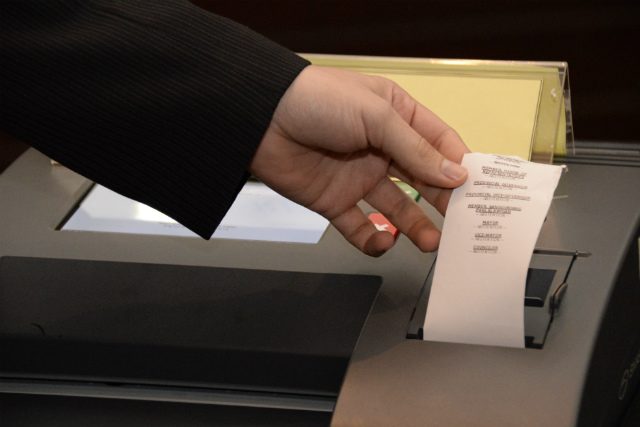SUMMARY
This is AI generated summarization, which may have errors. For context, always refer to the full article.

MANILA, Philippines – In a landmark ruling, the Supreme Court (SC) denied “with finality” the appeal of the Commission of Elections (Comelec) against issuing voting receipts on May 9 and in future elections.
It was one of the SC’s quickest decisions.
On Thursday, March 17, the SC announced its ruling only 30 minutes after the end of oral arguments, and less than a month after petitioners Richard Gordon and political party Bagumbayan filed the case on February 22. The High Court earlier called it a matter of “extreme urgency”.
The SC cited two main reasons for denying the Comelec’s appeal in a vote of 13-0:
- Paper ballots cannot replace voting receipts
- The Comelec confirmed it can find a way to issue voting receipts without postponing the May 9 elections
In its resolution published Thursday evening, the SC debunked the following arguments of the Comelec:
- Paper ballots already serve the purpose of voting receipts
- The law does not require each voter to “personally” verify if vote-counting machines counted their votes
SC: Paper ballots not enough
To disprove the Comelec’s claims, the High Court stressed the wording of the requirement under the law: a “Voter Verified Paper Audit Trail” or VVPAT.
“The phrase ‘voter verified’ modifies the ‘paper audit trail,’ which means that the voter himself or herself must verify the paper audit trail. It is incorrect for the Commission on Elections to argue that the law does not require each voter to verify whether the vote-counting machines recorded his or her votes properly,” the SC said.
The court added: “The paper ballots may be a form of a paper audit trail, but they are not voter-verified. Voter verification may only be done after the voter casts his or her votes. Voter verification of whether the vote-counting machine considered his or her ballot cannot simply be done with just the paper ballot.”
The SC cited a case it decided in April 2013 – Maliksi v Commission on Elections – in which the losing mayoral candidate “questioned the results of the elections.”
In the case of Maliksi, the physical ballots had been tampered with “to invalidate several votes.”
“As recognized by the Commission on Elections, the paper ballots in Maliksi were tampered with by shading another candidate’s circle for a specific position after the votes were cast,” the SC said.
“A voter’s receipt would not be vulnerable to the same type of tampering. The name of the candidate chosen by the voter for the position would already be printed on the voter’s receipt and could no longer be changed. It would be more difficult to subject the receipts to tampering or fraud,” it added.
Poll body ‘capable’
While the SC emphasized the “need to implement the law as it is written,” however, the Court said it initially recognized “that there will be technical and logistical difficulties” in enforcing its March 8 ruling.
Eventually, the oral arguments on Thursday convinced the SC that the Comelec “is capable of fully implementing the VVPAT feature” of VCMs on May 9.
The SC cited the two scenarios presented by the Comelec during Thursday’s oral arguments.
The first scenario would require the Comelec to postpone the elections to May 23. The second would allow it to proceed with the May 9 elections as scheduled.
In the first scenario, the Comelec would enable the voting receipts’ security features. These security features would be a ballot number, precinct number, and hash code for each receipt.
Installing these security features would require the Comelec to modify the source code or “master blueprint” of VCMs.
Modifying the source code is a weeks-long process that would force the Comelec to reschedule the elections to May 23.
On the other hand, in the second scenario, the Comelec would print “simple” voting receipts without security features.
This will not require touching the source code.
Under this scenario, the poll body said, it will not have to postpone the elections.
The SC said: “The Commission on Elections categorically manifested that, if the source code is not amended, the vote-counting machines can still be reconfigured to enable the machines to generate the voter’s receipts in time for the May 9, 2016 elections.”
Comelec partly lost by default
“We clarify. This Court’s Writ of Mandamus requires a voter’s receipt. The Writ of Mandamus is substantially complied with when a voter’s receipt is printed and the voter can physically verify his or her vote. Additional features may be added in the voter’s receipt for future elections,” the SC added.
In its resolution, the High Court also cited one reason why it favored Gordon and Bagumbayan in its initial decision against the Comelec.
The SC pointed out that the Comelec failed to meet its deadline to file its comment on the case. The poll body left itself defenseless against the petitioners.
“Hence, this Court was constrained to decide the case based on the merits presented solely in the Petition,” the SC said, explaining its 14-0 vote against the Comelec on March 8.
The Comelec, in effect, partly lost to Gordon and Bagumbayan by default. (READ: Why Comelec failed to defend itself before SC: ‘We were busy’)
Less than 3 hours after the SC denied the Comelec’s appeal “with finality” on Thursday, Comelec Chairman Andres Bautista told reporters that the Comelec “will comply” and do its best “to still ensure credible elections in 2016.”
Bautista also promised that the Comelec will hold the elections on May 9 as scheduled.
The elections chief said, “We submit.” – Rappler.com
Add a comment
How does this make you feel?
There are no comments yet. Add your comment to start the conversation.